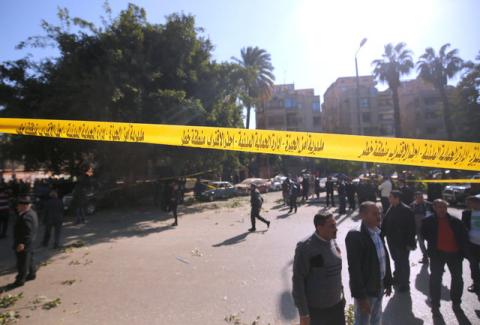Advertisement
Egypt security forces hit by two bombings in a single day
CAIRO (Reuters) - Egyptian security forces were hit by two roadside bombings in a single day on Friday that killed six policemen and wounded six in Cairo and the north of the country, security sources and officials said.
The attacks come as the government of President Abdel Fattah al-Sisi faces an insurgency waged by Islamist groups.
In the first incident, on Friday morning, a recently emerged Egyptian militant group claimed responsibility for a bomb in Cairo that the interior ministry said killed six policemen and wounded three others at a checkpoint on a main road leading to the Pyramids.
The Hasm Movement, which has claimed several attacks in Egypt in recent months, said it set off the bomb which, security sources said, also injured four civilians.
Eyewitness Ahmed Al-Deeb described a scene of carnage, with dead and dying policemen lying next to wrecked cars. One of the policemen had blast fragments in his chest and two more had lost legs, he told Reuters Television.
The second attack came on Friday evening in the Kafr El Sheikh governorate in the Nile Delta, where a roadside bomb killed a civilian and injured three policemen, security sources said. There was no immediate claim of responsibility.
The bomb was detonated remotely as a police car drove by, but it exploded seconds after the vehicle passed, sparing the lives of the officers, the sources said.
SINAI INSURGENCY
The government is taking on militants in the Sinai Peninsula, where militants loyal to Islamic State are based, and Islamist groups elsewhere in the country.
Security forces killed three gunmen on Tuesday in a raid on a hideout in southern Egypt they said was used by Hasm, which they described as an armed wing of the Muslim Brotherhood. The Brotherhood says it is a peaceful organization.
Hasm, the Arabic word for decisiveness, has accused judges of sentencing thousands of innocent people to death, or jailing them for life, at the behest of the military.
Egyptian judges have issued death sentences against hundreds of Muslim Brotherhood supporters since 2013, when President Mohamed Mursi, a member of the group, was overthrown by the army and arrested.
The Brotherhood, which won Egypt's first free elections after the 2011 uprising that ended Hosni Mubarak's 30 years in power, has since been banned and its leaders and members have largely been imprisoned or driven into exile or underground.
Since the crackdown, other small groups, including Hasm, have emerged. Hasm claimed responsibility in September for an assassination attempt on a senior prosecutor.
Militants loyal to Islamic State based in the Sinai have killed hundreds of soldiers and police.
Judges, policemen and senior officials have been targeted by radical Islamists angered by long prison sentences imposed on members of the Brotherhood.
(Reporting by Mohamed Elsherif and Ahmed Mohamed Hassan; Writing by Giles Elgood; Editing by Ralph Boulton and Robin Pomeroy)



















Add new comment